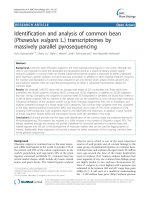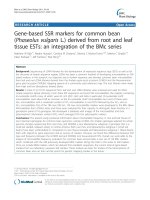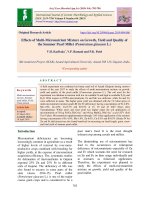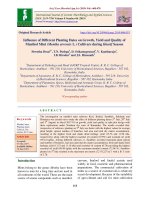Evaluation of French bean (Phaseolus vulgaris L.) genotypes for growth, pod yield and quality under sub-tropical condition of Garhwal Hills
Bạn đang xem bản rút gọn của tài liệu. Xem và tải ngay bản đầy đủ của tài liệu tại đây (206.63 KB, 7 trang )
Int.J.Curr.Microbiol.App.Sci (2020) 9(7): 974-980
International Journal of Current Microbiology and Applied Sciences
ISSN: 2319-7706 Volume 9 Number 7 (2020)
Journal homepage:
Original Research Article
/>
Evaluation of French Bean (Phaseolus vulgaris L.) Genotypes for Growth,
Pod Yield and Quality under Sub-Tropical Condition of Garhwal Hills
Hema and D. K. Rana*
Department of Horticulture, H.N.B. Garhwal University,
Srinagar- 246174, Uttarakhand, India
*Corresponding author
ABSTRACT
Keywords
Analysis, Growth,
Quality, Genotypes,
Yield
Article Info
Accepted:
11 June 2020
Available Online:
10 July 2020
The present investigation was carried out to study the evaluation of French Bean (Phaseolus vulgaris
L.) Genotypes for Growth, Pod Yield and Quality under Sub-tropical Condition of Garhwal Hills at
Horticultural Research Centre and Department of Horticulture, H.N.B. Garhwal University, Srinagar
Garhwal, (Uttarakhand), India during summer season, 2017. The experiment was laid out in
Randomized Block Design with three replications of 15 genotypes viz., Aishwarya, Anupam, Arka
Komal, Durga Pencil Bean, Nirmala 101, Nitara Green, Pant Anupama, Pauri Local, Pencil 66,
Rudraprayag Local, Shaguni, Srinagar Local, Somani, Selection-9 and Contender (Check cultivar).
During the investigation different growth, yield and quality parameters were recorded. The result of
analysis of variance revealed that the mean sum of square due to treatment were significant at 5%
level for all the traits. The result showed that, the genotype Rudraprayag Local responded superior
for number of pods per plant (21.10), yield of green pods per plant (249.92 g), yield of green pods
per ha.(499.75 q/ha) and number of pickings (5.00). The genotype Anupam recorded best for plant
height (63.61 cm), number of nodules per plant (14.5), fresh weight of nodules per plant (150.27 mg)
and the number of primary branches per plant (8.29). On the other hand, the average weight of the
pod (13.52 g) was estimated in genotype Pant Anupama. Thus, it can be concluded that, the genotype
Rudraprayag Local was recorded the best performer over check cultivar Contender with respect to
yield parameters. Hence, the genotypes Rudraprayag Local could be recommended to enhance the
production of french bean under subtropical condition of Garhwal Hills.
species Phaseolus aborigineus L. and
domesticated in Mexico, Peru and Colombia
about 8000 years ago. There are four
cultivated species of Phaseolus, viz. P.
vulgaris, P. coccineus, P. lunatus and P.
acutifolius var. latifolius.
Introduction
French bean (Phaseolus vulgaris L.)
belonging to the family leguminaceae is also
known by various names such as common
bean, snap bean, green bean, kidney bean,
haricot bean and dwarf bean (George, 1985).
The primary center of origin is Southern
Mexico and Central America while PeruvianEcuadorian- Bolivian area is the secondary
centre of origin. It is originated from wild
All the species are self-pollinated, except P.
coccineus which is generally cross pollinated.
Besides, adding atmospheric nitrogen with the
help of symbiotic bacteria in the root nodules,
974
Int.J.Curr.Microbiol.App.Sci (2020) 9(7): 974-980
it also adds considerable amount of organic
matter in the form of sufficient foliage. The
foliage of the crop also provides hay, silage
and green manure. The development of new
varieties is the long and expensive process
which also need expert scientist especially,
plant breeders. However, the evaluation of the
existing and available french bean varieties
for their adoption and productivity in the
climatic condition of Garhwal hills is a faster
way to improve french bean production. The
french bean varieties selected for sowing by
the farmers depends on several factors, which
include
production
ability,
regional
adaptability and availability of seeds and their
prices. The availability of seeds and the cost
of seeds affect the adoption of the varieties by
the farmer. If the seeds are expensive and
difficult to obtain, the farmer find other
available cheaper varieties in the local market
which are usually of low productivity.
Although several high yielding varieties and
hybrids have been introduced during the last
decades, there is a potential need for them to
be evaluated in the agro-climatic condition of
Garhwal. Most vegetable varieties trials
including french bean focus on yield and
quality attributes. The purpose of varieties
evaluation trials was to identify promising
french bean varieties and thus to provide upto-date variety recommendations for french
bean growers.
Aishwarya, Anupam, Arka Komal, Durga
Pencil Bean, Nirmala 101, Nitara Green, Pant
Anupama,
Pauri
Local,
Pencil
66,
Rudraprayag Local, Shaguni, Srinagar Local,
Somani, Selection-9 and Contender (Check
cultivar). French bean seeds were sown in the
field at a spacing of 45 cm x 10 cm in plots of
2 x 2 m size. During the investigation
different growth, pod yield and quality
parameters were recorded. The result of
analysis of variance revealed that the mean
sum of square due to treatment were
significant at 5% level for all the traits.
The growth and yield parameters like, days
taken to first germination, plant height (cm),
number of primary branches per plant,
number of nodules per plant, fresh weight of
nodules per plant (g), dry weight of nodules
per plant (mg), days taken to first flowering,
days taken to first pod set, days taken to first
pod picking, number of pods per plant, pod
length (cm), pod diameter (cm), pod weight
(g), yield of green pods per plant (g), yield of
green pods per plot (kg), yield of green pods
per hectare (q/ha), number of picking and
total soluble solid (oBrix) were recorded.
Results and Discussion
The representations of mean data of various
growth, yield and quality characters of French
bean genotypes in Table 1 and 2 are showing
significant variations.
Materials and Methods
The present experiment was conducted at
Department of Horticulture, Horticulture
Research Centre, Chauras H.N.B. Garhwal
central University, Srinagar, Uttarakhand
India, during summer season, 2017 titled,
“Evaluation of French bean (Phaseolus
vulgaris L.) genotypes for growth, pod yield
and quality under sub-tropical condition of
Garhwal Hills.” The experiment was laid out
in Randomized Block Design with three
replications consisting 15 genotypes viz.,
Growth characters
With respect to first seed germination the
minimum (8.59 days) days was observed in
Rudraprayag Local and the maximum (14.91
days) was noticed in Pauri Local. This may be
due to the combine effect of soil temperature,
moisture, texture and ability to germinate.
The maximum (63.61 cm) plant height at
harvest was recorded in Anupam showed
superiority over check cultivar Contender
975
Int.J.Curr.Microbiol.App.Sci (2020) 9(7): 974-980
(52.04 cm), whereas the minimum (37.11 cm)
plant height at harvest was found in Somani.
Basically plant height respond to several
factors, like genetic constitution, adaptability,
environmental condition, availability of
nutrients and other management factors. The
cumulative effect of these key factors showed
in the form of plant height of crop. Similar
results have also been reported by Anjanappa
et al., (2000), Pawar et al., (2007), Rana and
Kumar (2008), Das et al., (2014), Yadav
(2015) and Das (2017) in french bean.
in the Somani. The dry weight is directly
correlated with the fresh weight and nodules
size in crop. Similar observations have been
reported by Muthal (2013) and Das (2017) in
french bean.
Yield and quality characters
The minimum (40.85 days) days taken to first
pod set was recorded in Pant Anupama, which
was found to be significantly superior over
other genotypes but statistically at par with
Rudraprayag Local (41.22 days) and Arka
Komal (41.96 days). On the other hand,
maximum (49.46 days) days taken to first pod
set was found in Shaguni. The minimum days
(55.56 days) taken to first pod picking was
recorded in Rudraprayag Local, followed by
Pant Anupama (56.49 days) and Arka Komal
(57.69 days), which was found to be
significantly superior over other genotypes.
On the other hand, the maximum (62.70 days)
days taken to first pod picking was noticed in
Pauri Local. The maximum number of pods
per plant (21.10) was recorded in
Rudraprayag Local, followed by Arka Komal
(18.56) and Durga Pencil Bean (17.26), which
was found to be significantly superior over
the other genotypes, whereas minimum (9.66)
number of pods per plant was found in Pauri
Local. The maximum (13.52 g) average
weight of the pod was recorded in
Rudraprayag Local, which was found to be
significantly superior over other genotypes
but statistically at par with Arka Komal
(12.78 g) and Pant Anupama (11.39), while
the minimum (7.61 g) was found in Pauri
Local. The maximum (15.76 cm) length of
pod was observed in Rudraprayag Local
which was found to be significantly superior
over other genotypes but statistically at par
with Pant Anupama (15.71 cm) and Arka
Komal (15.66 cm). The minimum (10.53 cm)
length of pod was found in Pencil 66. The
maximum (1.81 cm) diameter of pod was
recorded in Pant Anupama, which was found
The maximum (8.29) number of primary
branches per plant was recorded in genotype
Anupam, whereas the minimum (3.71)
number of primary branches per plant was
recorded under the genotype Somani. The
minimum (35.66 days) days taken to first
flowering was recorded in genotype Arka
Komal. On other hand the maximum (43.53
days) days taken to first flowering was
recorded in the genotype Shaguni.
The maximum (14.59) number of nodules per
plant was recorded in genotype Anupam
while the minimum (7.78) was recorded under
the genotype Somani. The number of nodules
per plant is depends on the number of lateral
root that in the plant and the nodulation is
controlled by a variety of process, both
external (heat, soil conditions, drought and
nitrate) and internal factors (auto-regulation
of nodulation and ethylene). These factors
regulate the number of nodules per plant. The
maximum (150.27 mg) fresh weight of
nodules per plant was recorded in Anupam
and minimum (75.05 mg) fresh weight of
nodules per plant was recorded in Somani.
The fresh weight of nodules is directly
correlated with the number of active nodules
and their size. Dry weight of nodules per plant
was recorded in Anupam which was found to
be significantly superior over other
genotypes, whereas the minimum (12.67 mg)
dry weight of nodules per plant was observed
976
Int.J.Curr.Microbiol.App.Sci (2020) 9(7): 974-980
to be significantly superior over other
genotypes but statistically at par with
Rudraprayag Local (1.73 cm) and Arka
Komal (1.25 cm). On the other hand, the
minimum (0.56 cm) diameter of pod was
found in genotype Nitara Green. Significantly
maximum (5.00) number of pickings were
observed in genotype Rudraprayag Local,
followed by Pant Anupama (4.67) and Arka
Komal (3.67), while the minimum (2.00)
number of pickings were observed in Pencil
66 and Somani.
superior over other genotypes but statistically
at par with Arka Komal (15.40 kg) and Nitara
Green (14.43 kg), whereas the minimum (7.33
kg) yield of green pods per plot (kg) was
found in Pauri Local. The maximum (499.75
q/ha) yield per hectare was recorded in
Rudraprayag local, which was found to be
significantly superior over other genotypes
but statistically at par with Arka komal
(385.08 q/ha) and Pant Anupama (360.75
q/ha). On the other hand, minimum (183.17
q/ha) yield was found in Pauri local. Yield is
nothing but it is a cumulative effect of several
factors like plant height, number of branches,
pod length, pod diameter, pod weight.
The maximum (249.92 g) yield of green pods
per plant was recorded in the genotype
Rudraprayag Local, followed by Arka Komal
(192.90 g) and Pant Anupama (180.44 g),
whereas the minimum yield of green pods per
plant was observed in Pauri Local (91.68 g).
The maximum (19.99 kg) yield of green pods
per plot (kg) was recorded in Rudraprayag
Local, which was found to be significantly
Yield of green pod per hectare is directly
correlated with the yield of green pods per
plant and yield of green pods per plot. Singh
et al., (2009) Patel et al., (2011), and Prakash
and Ram (2014) reported similar findings in
french bean.
Table.1 Mean performance of french bean genotypes for growth parameters
Genotypes
Aishwarya
Anupam
ArkaKomal
Durga Pencil
Bean
Nirmala 101
Nitara Green
Pant Anupama
Pauri Local
Pencil 66
Rudraprayag
Local
Shaguni
Srinagar Local
Somani
Selection-9
Contender
(Check)
S.Em±
CD at 5%
Days taken
to first
seed
germination
13.56
9.13
11.03
11.91
Plant
height
(cm)
No. of
primary
branch
47.15
63.61
54.59
49.06
6.90
8.29
7.41
5.22
Days
taken to
first
flowering
41.09
36.83
35.66
39.88
13.24
13.98
12.16
14.91
11.58
8.59
46.92
40.25
44.77
46.15
53.07
46.48
6.57
4.89
5.32
5.47
6.58
5.12
13.40
11.98
12.13
11.54
8.58
44.27
45.68
37.11
49.87
52.04
1.31
3.81
2.2
5.84
11.18
14.59
13.68
12.17
Fresh weight
of nodules
per plant
(mg)
86.10
150.27
144.30
131.75
Dry weight
of nodules
per plant
(mg)
18.02
45.89
42.54
35.11
40.03
38.86
37.54
40.26
39.33
36.93
11.87
12.14
11.72
12.30
10.74
11.92
81.10
120.67
86.56
132.99
80.82
88.69
15.40
34.42
18.44
36.44
15.40
19.56
6.19
6.23
3.71
5.40
7.39
43.53
39.69
40.18
39.65
35.80
12.14
11.93
7.78
12.78
12.49
129.46
126.39
75.05
134.71
133.20
34.25
33.60
12.67
41.69
40.31
0.65
1.89
1.15
3.34
0.99
2.85
0.42
1.22
0.29
0.85
977
No. of
nodules
per plant
Int.J.Curr.Microbiol.App.Sci (2020) 9(7): 974-980
Table.2 Mean performance of french bean genotypes for yield and quality parameters
Days
taken
to first
pod
set
Days
taken to
first pod
picking
Number
of pods
per plant
Pod
weight
(g)
Pod
length
(cm)
Pod
diameter
(cm)
Yield of
green
pods per
plant (g)
Yield of
green
pods per
plot (kg)
Number
of picking
Yield of
green
pod per
hectare
(q/ha)
Total
soluble
solid
(0Brix)
Aishwarya
46.32
58.18
15.97
9.35
13.32
0.63
149.79
11.98
3.00
299.42
5.53
Anupam
42.57
60.91
12.12
11.29
15.62
1.06
101.42
8.11
3.33
202.75
6.50
ArkaKomal
41.96
57.69
18.56
12.78
15.66
1.25
192.90
15.40
3.67
385.08
7.02
Durga Pencil Bean
46.49
58.64
17.26
9.97
12.62
1.04
173.13
13.85
2.33
346.17
5.57
Nirmala 101
47.48
61.64
11.22
10.32
15.13
0.88
100.72
8.05
3.00
201.25
5.06
Nitara Green
44.41
57.86
14.03
8.66
15.46
0.56
107.27
8.58
3.00
214.42
5.73
Pant Anupama
40.85
56.49
13.31
11.39
15.71
1.81
180.44
14.43
4.67
360.75
6.60
Pauri Local
47.64
62.70
9.66
7.61
11.15
1.07
91.68
7.33
2.33
183.17
5.64
Pencil 66
45.83
59.02
10.01
10.87
10.53
1.13
109.18
8.73
2.00
218.25
5.20
Rudraprayag Local
41.22
55.56
21.10
13.52
15.76
1.73
249.92
19.99
5.00
499.75
5.59
Shaguni
49.46
58.72
17.09
8.23
14.19
1.04
160.30
12.82
3.00
320.50
5.51
Srinagar Local
44.53
57.71
16.52
8.42
13.50
0.76
168.87
13.51
3.33
338.17
5.58
Somani
48.34
58.03
15.63
8.40
12.32
1.03
179.62
14.37
2.00
359.17
5.30
Selection-9
46.97
60.20
14.54
10.34
12.03
1.23
165.88
13.27
3.33
331.67
5.44
Contender (Check)
40.36
55.83
19.59
13.31
15.59
1.33
208.33
16.66
3.33
416.58
6.65
0.67
1.95
0.42
1.21
0.58
1.69
0.95
2.76
1.02
3.98
0.14
0.40
17.32
50.17
1.39
4.02
0.33
0.96
34.66
100.41
0.29
0.83
Genotypes
S.Em±
CD at 5%
978
Int.J.Curr.Microbiol.App.Sci (2020) 9(7): 974-980
Maximum (7.02 0Brix) total soluble solid was
recorded in Arka komal, which was found to
be significantly superior over other genotypes
but statistically at par with Pant Anupama
(6.60 0Brix) and Anupam (6.50 0Brix),
whereas the minimum (5.06 0Brix) total
soluble solid was found in Nirmala 101. The
similar findings were reported by Sarangi and
De (2010) in French bean and Bhutia et al.,
(2017) in Pea.
594 – 598.
George RAT. 1985. Vegetable Seed
Production. Longman, London & New
York, pp:193- 207.
Muthal KM. 2013. Evaluation of french bean
(Phaseolus vulgaris L.) varieties for
Northern dry-zone of Karnataka. M.Sc.
Thesis. University of Horticultural
Sciences, Bagalkot.
Patel BV, Parmar BR, Parmar SB and Patel
SR. 2011. Effect of different spacings
and varieties on yield parameters of
cowpea (Vigna unguiculata L.). The
Asian Journal of Horticulture, 6(1): 5659.
Pawar SU, Kharwade ML and Awari HW.
2007. Effect of plant density on
vegetative
growth
and
yield
performance of different varieties of
french bean under irrigated condition.
Karnataka Journal of Agricultural
Science, 20(3): 684-685.
Prakash J and Ram RB. 2014. Genetic
variability, correlation and path analysis
for seed yield and yield related traits in
french bean (Phaseolus vulgaris L.)
under
Lucknow
conditions.
International Journal of Innovative
Science, Engineering and Technology.
1(6): 41-50.
Rana DK and Kumar A. 2008. Performance
of various french bean (Phaseolus
vulgaris L.) genotypes under mid-hill
condition of Garhwal Himalaya.
Progressive Horticulture, 40(2): 184186.
Sarangi SK and De LC. 2010. Varietal
evaluation of french bean (Phaseolus
vulgaris L.) at mid-hills of Arunachal
Pradesh. Indian Journal of Hill
Farming, 23(2): 53-54.
Singh AK, Singh SB and Singh V. 2009.
Influence of nitrogen doses on growth
and green pod yield parameters of
french bean varieties during kharif
season under subtropical area of Jammu
On the basis of results obtained from the
present investigation, it may be concluded
that, the genotype Rudraprayag Local
recorded best performer over check cultivar
Contender with respect to yield parameters.
Hence, the genotypes Rudraprayag Local
could be recommended to enhance the
production of french bean under subtropical
condition of Garhwal Hills.
References
Anjanappa M, Reddy NS, Krishnappa KS,
Murali K and Pitchaimuthu M. 2000.
Performance of french bean varieties
under southern dry region of Karnataka.
Karnataka Journal of Agriculture
Science, 13(2): 503-505.
Bhutia TL, Shivani and Saurabh K. 2017.
Evaluation of different varieties of pea
(Pisum sativum L.) for yield and quality
under late sown conditions in Eastern
region. Crop Research, 52 (4 & 5): 176179.
Das K. 2017. Varietal performance of bush
type french bean varieties (Phaseolus
vulgaris L.) for growth, fresh pod yield
and quality. M. Sc Thesis. Uttar Banga
Krishi Viswavidyalaya, Pundibari,
Cooch Behar, West Bengal, India
Das R , Thapa U , Debnath S , Lyngdoh
YA and Mallick D. 2014. Evaluation
of french bean (Phaseolus vulgaris L.)
genotypes for seed production. Journal
of Applied and Natural Science, 6(2):
979
Int.J.Curr.Microbiol.App.Sci (2020) 9(7): 974-980
region. Legume Research, 32(2): 142144.
Yadav BVS. 2015. Performance of vegetable
french bean (Phaseolus vulgaris L.) as
influenced by varieties and sowing
dates under Southern Zone of Andhra
Pradesh. M.Sc. Thesis. Dr. Y. S. R.
Agricultural University, Y. S. R.
District, Andhra Pradesh.
How to cite this article:
Hema and Rana. D. K. 2020. Evaluation of French Bean (Phaseolus vulgaris L.) Genotypes for
Growth, Pod Yield and Quality under Sub-Tropical Condition of Garhwal Hills.
Int.J.Curr.Microbiol.App.Sci. 9(07): 974-980. doi: />
980









